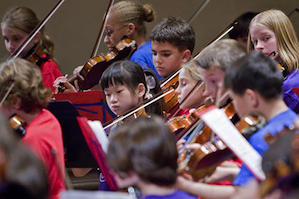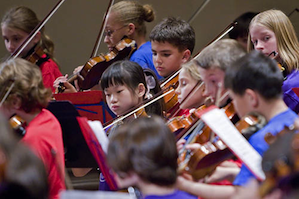We’ve added a new resource for parents: descriptions of school music programs in the greater Bay Area. We provide a look at the music resources and philosophy that different schools offer. This week we talked to Eugene Sor, of the Crowden School in Berkeley. He is interim music director of the Crowden School and director of its sister organization, the Crowden Center for Music in the Community.

The Crowden School was founded in 1983 in a church basement by Anne Crowden, who had served on the music department faculties at the UC Berkeley, Stanford, and the San Francisco Conservatory of Music. She was a violinist intensely interested in the virtues of string instruments and chamber music. In the beginning, she offered bowing and technique classes to 11 students and from that the school was born. She ran it for 16 years and died in 2004.
The school now has 55 students and covers fourth through eighth grade. Admission includes an audition, an academic placement test, and informal visit to the school, along with a personal interview. The basic requirement is that a student be interested in learning a string instrument. There are some exceptions for those studying piano.
“Our mission,” Sor told us, “is to give students both a well-balanced music education and an outstanding academic education.”
Chamber music is at the core of the curriculum and is also the metaphor that best describes what we’re trying to impart — finding your voice. Certainly one of the great joys of playing chamber music is that unique harmony you experience within yourself and within a group. Moreover, to participate in the ensemble you’re obligated to practice, again by yourself and with the group. I, myself, learned more sitting in a music room, by myself or with a coach, than I did sitting in a conventional classroom. It’s not only the hands-on experience, but it’s also the way you study the music; the way you hear music; the way you appreciate textures and interpretations — and the way you come to understand music history and theory. The benefits apply to critical thinking and to becoming responsible and self-reliant.But in the end, I think the most important aspect of this education is that you learn how to listen to each other on a deeper level and you learn the real meaning of community and how a community succeeds, which means understanding the art of leading and following; improvising and communicating; and finally, trusting. Trusting yourself and others. And there’s one other thing — you learn how to enjoy music and just have fun. That’s so important.”

